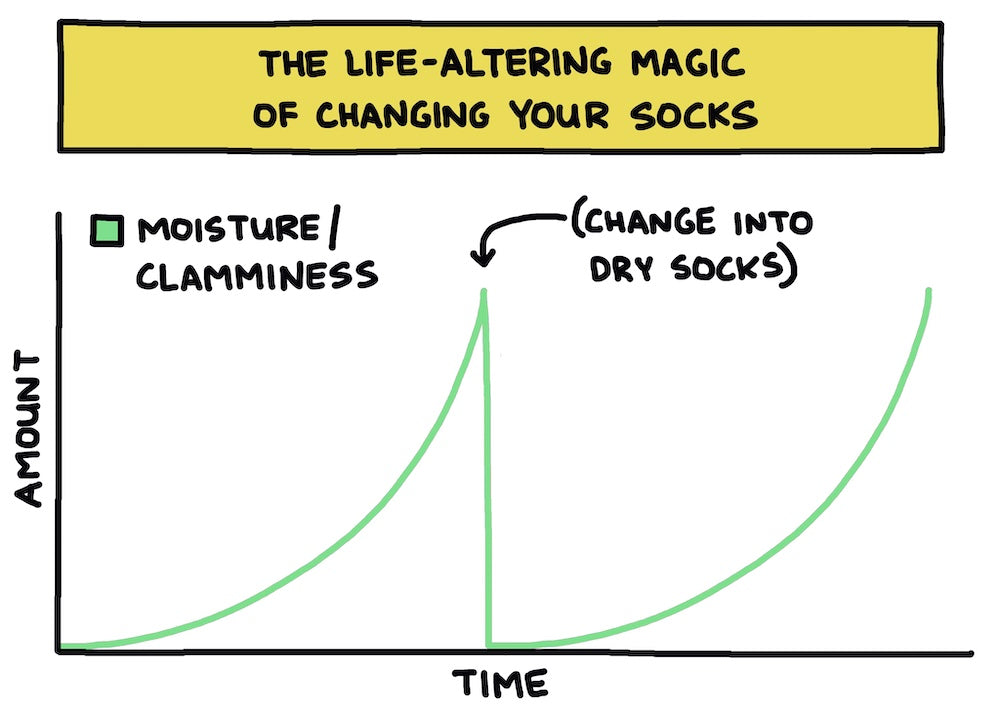The Life-Altering Magic of Changing Your Socks

A million years ago, when I was a neophyte peak-bagger reading an outdoor magazine, I remember reading someone’s story about camping with a friend, and how they kept rolling over in their sleeping bag, unable to get to sleep after a long day of hiking with heavy packs. The friend, a grizzled veteran of many nights out under the stars, woke up and muttered, “Change your socks.” The writer did just that, putting on a dry pair of socks, and fell asleep soon after.
One Little Anecdote
When I think of stories that inspired me in the outdoors, I think of some Banff Film Festival climbing films, several mountaineering and bicycle touring memoirs, and lots of tales of ultramarathon runners. But I also think about that one little anecdote in that magazine from sometime in the early 2000s: Change your socks.
After reading that story, I went on to spend hundreds of nights in a sleeping bag, bikepacking, backpacking, ski touring, and car camping. No matter how light I packed, I always had a backup pair of dry socks in my bag.
Once we had set up camp and were wriggling into our sleeping bags for the night, I’d pull off my damp socks I’d been hiking or pedaling in all day, pull on my dry pair of socks, and leave the damp ones in the lower half of my sleeping bag, to dry out overnight.
If it was a multi-day trip, I’d keep alternating the socks through the duration of the trip. And I never had trouble sleeping because of cold, damp feet. My feet did not always smell that great at the end of a five- or six-day trip, but that’s a different story.

"Smell This"
The aforementioned different story: When I worked at a nonprofit, I used to help lead backpacking trips for teenagers. Three summers in a row, I took a week off work and, along with a couple other adults, took five teenage boys out on their first backpacking trip, in the mountains of California or Oregon. I have many stories from those days, but one of the most memorable is also one that could be titled “Change Your Socks.”
We’d had a pretty good trip with a group of teens from Portland, aside from a little surliness on the last day from one of the kids who’d decided to not go No. 2 for the duration of the five-day trip, but we made it through four nights in the Wallowa Mountains on what was most of the teens’ first experience sleeping in a tent. The nonprofit I worked for supplied the gear for the trips, and the kids all got to go home with a free pair of hiking boots, thanks to the generosity of a donor.
After the trip was over, we’d collect all the fleece jackets, backpacks, sleeping pads, tents, and sleeping bags the kids had used. We’d head to a laundromat and wash the sleeping bags and clothing in a few big front-loading washers.
I had been in this laundromat with Jack, my co-trip leader, for several hours, killing time while we waited for the gear to finish the cycles. We’d taken turns grabbing food, making phone calls, and watching the laundry, and Jack had mentioned something about having to run one of the sleeping bags through a couple times. After the second time, he turned the bag inside out and held up the foot box, saying, “Smell this.”
I think it’s a general rule of the human existence that anytime someone holds up something and says, “Smell this,” it’s going to be a negative experience for the smeller about 98 percent of the time. I figured Jack had a good reason, so I leaned in, not too close, and sniffed. Wow. Rotten eggs? A dead animal? What was that?
“Yeah,” he said.
“What … how?” I asked.
“So I guess [teenager’s name redacted] didn’t change his socks the entire trip,” Jack said.
“But … we swam in that lake the one day, right?”
“[Teenager’s name redacted] didn’t swim.”
“Oh … yeah,” I said. “Wow.”
We ran the bag through a third cycle, on its own, and when it came out … it still smelled like something had died in the foot end. Thankfully, the nonprofit I worked for, although short on a lot of things, especially funding, was not short on sleeping bags. We could donate one sleeping bag, or throw it in the trash, and I forgot which we did, but [teenager’s name redacted]’s sleeping bag did not make the return trip with us.
I had tried throughout the week to help the guys with whatever advice I could about life, but the one thing we hadn’t covered, that I wish we had: Change your socks.

Damage Done
A full decade later, I would find myself not heeding my own advice, in a completely different setting: The Hellbender 100 ultramarathon in the Black Mountains of North Carolina. It was my second 100-mile race, and as far as conditioning and logistics went, I felt pretty good.
I’d meet my wife, Hilary, at Mile 48 and Mile 71, and she’d have a rental car full of snacks and all the other stuff I might need: sunscreen, Body Glide, Band-Aids, extra pair of shoes, extra socks. This turned out to be a pretty solid plan: I changed my socks at Mile 48 and planned to do it again at Mile 71. My feet sweat when I run, and fresh socks always seem like they help.
Except during this race, which took place in mid-spring, and amid micro-rainstorms that downpoured on runners on some parts of the course at certain points. We all got drenched in the first 15 miles, but I managed to stay pretty dry after that. But one part of the trail in particular did not: The Buncombe Horse Trail.
I didn’t really “see” much of the trail, since by the time I got to that part of the race, around Mile 65, it was dark and had been dark for a couple hours. What I could see was that lots of the trail, a double-track cutting across the face of a mountain, was saturated.
At first, I tried to hop from dry-ish spot to dry-ish spot, avoiding the worst of the standing water, but I soon gave up because there was no way I could keep it up for who knows how many miles.
My shoes, socks, and feet got soaked, and by the time I was getting close to the aid station at Mile 71, blisters had started to form where my toes met the balls of my feet. I changed my socks, but the damage was done, and I spent the next 27 miles gritting my teeth and trying to keep moving through probably the worst blister pain of my life.
Had I known then what I know now, would I have carried an extra pair of socks in my race vest, so I could change them as soon as I got through the wet section? [checks weight of pair of running socks: 1.1 ounces] Yes. Yes I would.
Bits of Advice
When I think back on the best advice I’ve received in life, I have a pretty long list of things people have said to me that apply to big-picture things like relationships, career choices, and mental health. But I have to say, even though it seems like a small thing, something that’s right up there with all of those bits of advice is simply: Change your socks.
About the Author
Brendan Leonard is a writer, illustrator, filmmaker, and ultramarathon and trail runner. He's been writing and drawing at Semi-Rad.com since 2011, and is a columnist for Outside Magazine. He lives in Montana.







